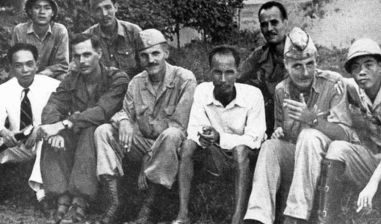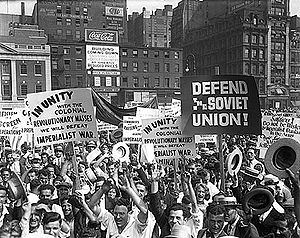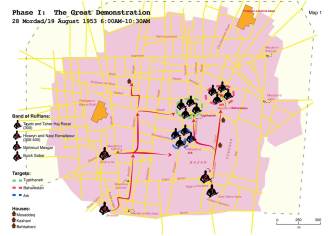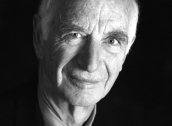Part One
The Adams’
The Adams’ are an old New England Yankee family. After attaining a Law degree from Yale (as both his father and grandfather had done before him), Frank Adams signed up to fight fascism in World War Two. He joined the Office of Strategic Services, America’s first national intelligence service. Most of its members came from conservative backgrounds, but quite a few, like Frank, were liberals and true believers in the Franklin Roosevelt’s New Deal.
As a government agency, the OSS was unique in American history. Many of its top leaders were Ivy League graduates, while among its most effective operatives on the ground – and behind enemy lines – were communists and veterans of the Abraham Brigade which had recently fought fascism in Spain. Richard Harris Smith’s book OSS – The Secret History of America’s First Central Intelligence Agency is a fascinating narrative of how the 11,000 members of its intelligence and sabotage units engaged in many of the unheralded but critical episodes of the war while negotiating bizarre coalitions of right-wing monarchists and left-wing revolutionaries in every country in Europe and the Far East.

Ho Chi Minh (center) and Vo Nguyen Giap (far left) with American OSS agents planning action against the Japanese, 1945
The 2006 film The Good Shepherd describes the OSS’s idealistic origins and its dark transformation into the criminal CIA.
But all that came later. Frank served honorably, and at war’s end he felt that America was indeed fulfilling its destiny to defend freedom and bring opportunity to the world. There was only one problem – he believed (I will be using this word a lot) in the idea of American exceptionalism, that America always did right, and always for the right reasons, and that even when it didn’t this was because of human mistakes. And he naturally believed in one of its main corollaries, that the Evil Other was determined to subvert America’s ideals, for no reason other than its own depravity.
And in Frank’s time, once Germany and Japan had surrendered, the Other appeared to be the cancer of international communism that threatened democracy everywhere. So, when the O.S.S. transformed into the Central Intelligence Agency, Frank continued his career in covert operations as a willing soldier in America’s anti-communist crusade. For a while, his belief in the CIA’s mission kept him from realizing that it was purging all the liberals and was functioning to destroy popular movements for self-determination everywhere, from Italy, Greece and Iran to Southeast Asia, Africa and Latin America.
The Zeligs
In the first decade of the twentieth century, the Zelig family, like millions of others, escaped anti-Semitic pogroms in Eastern Europe and immigrated to America, which they considered the beacon of democracy and freedom. But they never forgot their socialist ideals (honed before the Russian revolution), and they were politically active in their new home, New York City. By social class, ethnicity, politics and their sheer newness, they were the exact opposite of the Adams – but they were also true believers.  As a 15-year-old in 1937, Al Zelig stood on street corners raising money for that same Spanish Republic that so many New York Jewish progressives were fighting for, some of whom would later join Frank Adams’ OSS.
As a 15-year-old in 1937, Al Zelig stood on street corners raising money for that same Spanish Republic that so many New York Jewish progressives were fighting for, some of whom would later join Frank Adams’ OSS.
Both progressives and conservatives held the notion of progress, along with freedom, as their highest ideal. As I write in Chapter Nine of my book, Madness at The Gates of the City: The Myth of American Innocence:
Socialists also believed in progress. Freedom, writes (Robert) Nesbit,
…became inseparable from “membership in some collective or community…and from the creation…of a new type of human being.” The religious expectation that had driven men for centuries shifted to socialism’s secular dream without losing intensity. Marx put the golden age at the end of history rather than at the beginning. Communism would be “the solution of the riddle of history.” Its universally compelling appeal had overtones of the Book of Revelation. People everywhere sang the words of The Internationale: “Tis the final conflict.”
In Spain, members of the International Brigades sang it in twenty languages. Spain, like no other time or place in the twentieth century, was a place of possibility, where people crossed borders, sacrificing their futures not for religion or to glorify their fathers, but simply to make a better world. For many, Spain still symbolizes what might have been. And, like any war between brothers, including America’s, the Spanish Civil War evokes the conflict between unreconciled parts of the psyche, for which we may substitute Frank and Al. Neither of them went to Spain, but the shadow of that tragedy hangs over this story.
Years later, Al and his wife joined the American Communist Party, as fully committed to their vision of the future as Frank Adams was to his. Frank’s son Ron, born shortly after the war, spoke Spanish, ironically, as his first language, because he lived his first four years in Peru, where the C.I.A. had stationed his father. Al’s son Danny was born the same year and, like Ron, was a post-war child steeped in his parent’s idealism.
Parallel Childhoods
1953 was a critical year for the two families. Both McCarthyism and the Hollywood Blacklist were at their heights. Under the banner of resisting Communism, the American empire was crushing dissent at home and extending itself across the world.
Tehran, Iran, August 19th: Ron Adams, age six, sat in the front seat of a car holding a metal box as his father drove through the city. Ron learned later that it contained thousands of dollars in cash that Frank and his CIA cohorts were distributing to corrupt politicians and thugs. This map shows their whereabouts.
Directed by another OSS alumnus, Kermit Roosevelt, they were in the process of overthrowing Iran’s elected government and installing a brutal monarchy that itself would not be overthrown until the Islamic revolution of 1979.
In the following year, the CIA would overthrow another democratically elected government in Guatemala, leading to decades of civil war and genocide against the Mayan people.
As I write in Chapter Eleven:
Imagine America entering the liminal period of 1953-1955. Imagine it as a time during which the empire reached its apogee (the current madness being merely a last gasp), when the seeds of its collapse first sprouted. The U.S. had a position of security that was unparalleled in human history, with absolute control over the Western Hemisphere and both oceans. Its economy and culture dominated the world. And yet anticommunist hysteria was running wild.
In April 1953, President Eisenhower barred gays from all federal jobs. In June, the government executed Julius and Ethel Rosenberg. The Korean War ended in stalemate in July, just as the Cuban revolution began. In August, the C.I.A. overthrew Iran’s government. Kinsey’s second volume, on female sexuality, appeared in the fall. War of the Worlds left viewers staring fearfully at the stars for signs of the next incursion by The Other, while Shane presented the lone Redemption Hero in his most classic form, literally riding off into the sunset. In December, the first issue of Playboy with nude pictures of Marilyn Monroe arrived.
In May 1954 the French surrendered at Dien Bien Phu (Viet Nam). Ten days later, the Supreme Court made its decision in Brown vs Board of Education, jump-starting the Civil Rights Movement. In June, Congress added the words “under God” to the Pledge of Allegiance, and the C.I.A. overthrew another democracy in Guatemala. Three days later, Viet Nam was divided, marking the official beginning of America’s involvement. In August, as the C.I.A. defeated the insurrection in the Philippines, Congress made membership in the Communist Party a felony.
Consider that last fact: it was now a crime to join a political party in America.
Part Two
In that same period, the Zeligs were moving their residences every three or four months. As committed, underground communist cadres, Al and his wife had been assigned the task of providing safe houses for fugitive radicals who were evading the F.B.I. Each time they moved to a new town, they changed their jobs, their churches and their surnames. And they instructed their impressionable six-year-old son that he had to – several times – falsify his first name. One month, Danny would be Tommy; another month he would be Robert. At first it was a game; later it was simply crazy making.
Ideologically opposed as they were, both Frank Adams and Al Zelig had built their entire identities upon what turned out to be thin veneers of belief. Generations before, both of their families had spurned organized religion. But, as James Hillman taught, all Americans are “psychologically Christian… we are each…like it or not, children of the Biblical God. It is a fact, the essential American fact.”
What does Hillman’s curious statement mean? I interpret it as a lament that in this demythologized world, we are all essentially uninitiated persons who have long forgotten the indigenous capacity to think metaphorically. As such, we tend to use literalized, polarized, “either-or” terminology. We are all monotheists at heart, and our default mode, even as educated liberals, is to fill the holes in our creative imaginations with belief systems of one form or another and to demonize opposing points of view. And it is a simple temptation when we lose faith in one system to quickly replace it with another.
We have been conditioned over the centuries to reduce the multi-layered mystery of world and self to the simplistic dualisms of monotheism: whatever isn’t aligned with our god must necessarily follow his opposite. Here is a clue: if your people consider their story to be literally true and other people’s stories are “myths,” then you and your people are thinking literally. Other mono-words share the brittleness of one correct way: monopoly, monogamy, monolithic, monarchy, monotonous.
As monotheism triumphed, it transformed difference into “otherness,” as a threat to be eliminated. But in our bones, we still have the vestigial memory of an original, creative, animist, pagan imagination that appreciates diversity and welcomes all gods and all emotions, including humor. Hillman insisted, “The Gods don’t require my belief for their existence, nor do I require belief for my experience of their existence.”
So it seems to me that If solutions to our great social and environmental crises emerge, they will originate outside of the monoculture’s arrogantly monocular view, from people on the edges, people who, in Caroline Casey’s words, “…believe nothing; entertain possibilities.”
As soon as the generals and the politicos
can predict the motions of your mind, lose it.
Leave it as a sign to mark the false trail, the way you didn’t go.
– Wendell Berry
The danger – and the opportunity – that belief offers us is to lose it, to lose faith, to become disillusioned. For some of us, as Hillman wrote, this tragic blessing happens through betrayal.
All of the grand, over-arching, ideological mono-liths of our Judeo-Christian tradition, from the Crusades to the Inquisition, to American Puritanism to Nazism to radical Islam have utilized betrayal and the fear of betrayal for their own ends. But perhaps the utopia symbolized by international communism is the saddest story of our past century, where the lives of Frank and Al, and millions of believers like them, intersected. Unfortunately, like all the ideologies that came before, communism accepted the primacy of means over ends, that any crimes whatsoever were acceptable if they furthered the “cause.” Adam Kirsch writes:
By the late nineteen-thirties, Western intellectuals who sympathized with Communism had already proved themselves capable of accepting a great deal of killing in the name of the cause…(They) usually justified Stalinism’s crimes as the necessary price of building a socialist future, and of defending it against a hostile capitalist world. Walter Duranty, the Times’ correspondent in Moscow, excused the three million famine deaths that were caused by the push to collectivize Soviet agriculture, writing that, “to put it brutally—you can’t make an omelet without breaking eggs.”
The twin shadows of belief are betrayal and martyrdom. Indeed, Christianity became the first religion to make martyrdom a demand of faith. Leonard Shlain put this process into historical context:
Until the Christian martyrs, there does not occur anywhere in the recorded history of Mesopotamia, Egypt, Persia, Greece, India or China a single instance in which a substantial segment of the population accepted torture and death rather than forswear their belief in an ethereal concept.
Even as deeply idealistic men like Frank and Al – communists, anti-communists. socialists, liberals, labor activists, anarchists, fascists, anti-fascists, monarchists, Catholics and poets – were sacrificing themselves on the arid fields of Spain between 1936 and 1939, Stalin’s show trials were destroying thousands, perhaps millions of lives. Their alleged crimes: betrayal of the cause. One of these believers in intellectual orthodoxy was Arthur Koestler, who in his disillusionment would go on to write Darkness At Noon, Dialogue With Death and The God that Failed. Kirsch continues:
Koestler…did not become a Communist “by a process of elimination.” Rather, he compared the experience to a religious conversion. “The whole universe falls into pattern like the stray pieces of a jigsaw puzzle,” he wrote. “There is now an answer to every question.”
Soviet Communism in its heyday served many people around the world as a secular religion. Today, although Marxist ideas and the label “socialist” have been resurgent on the left, the enormous influence once exerted by Communism now seems a distant phenomenon. To its adherents, Communism was not just a party identification but a complete theory of life and history, which dictated both personal and political morality. And it was the conflict between that morality and ordinary moral instincts—which condemned things like lying and killing, which the Party often demanded—that provided the dramatic focus of “Darkness at Noon”…every political creed must eventually face the question of whether noble ends can justify evil means. As Koestler saw, this problem reached its pure form in Communism because its avowed aim was the noblest of all: the permanent abolition of social injustice throughout the world. If this could be achieved, what price would be too high? Maybe a million or ten million people would die today, but if billions would be happy tomorrow wasn’t that worth it? A Communist revolutionary, Koestler writes, “is forever damned to do what he loathes the most: become a butcher in order to stamp out butchery, sacrifice lambs so lambs will no longer be sacrificed.”
Frank’s belief system was no different. He saw close up how anti-communism was as much a system of mass murder as Stalin’s was, but he justified his crimes because of his noble ideals. His politics, like Al’s, had been an all-encompassing faith; psychologically they were no different from other fundamentalists. And each inevitably became disillusioned. Perhaps eventually each of them might have agreed with Koestler: “A harmful truth is better than a useful lie.” But each in his way experienced the dark reality behind his passionate commitment when he felt betrayed by those he had served. I would imagine that they each felt, even in their agnosticism, that God himself had betrayed them.

